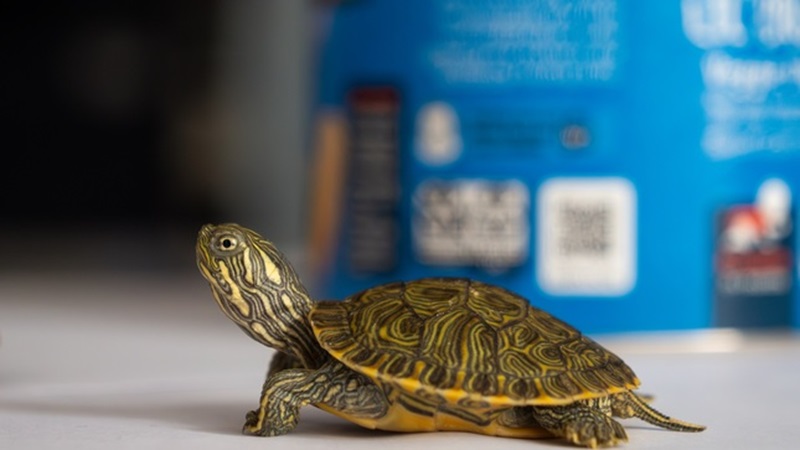In a decisive effort to combat wildlife trafficking, an operation conducted by Peru’s National Forest and Wildlife Service (SERFOR) resulted in the rescue of 164 yellow-spotted river turtles, a species native to the Amazon region, which were being illegally sold as pets in central Lima. The rescue, carried out on Wednesday (15th), stands as a significant victory in the fight to preserve this endangered species but also highlights the precarious and alarming conditions in which these animals were being kept.
The police operation, conducted on Thursday (9th), was triggered by information about an underground wildlife market in the central region of the Peruvian capital. Authorities seized the turtles, which were being sold in unsuitable containers, such as plastic bags and glass jars, without any concern for the animals’ welfare or health. In addition to rescuing the turtles, the operation led to the arrest of three individuals who now face legal proceedings for their involvement in the illegal wildlife trade—a crime with profound implications for the country’s biodiversity and ecological balance.

Yellow-spotted river turtles, known in Peru as Taricaya (Podocnemis unifilis), are among the many Amazonian species threatened by illegal capture for the exotic pet trade. Native to regions such as Loreto, Ucayali, Madre de Dios, and San Martín, these turtles inhabit the basins of various rivers in the Peruvian Amazon. They play a vital role in the local ecosystem, contributing to seed dispersal and maintaining the ecological balance of river systems.
The illegal capture of these turtles, often carried out in a predatory manner with no regard for environmental impact, threatens their survival. Moreover, removing individuals from their natural habitats further harms wild populations, compounding the already fragile biodiversity of the Amazon region. According to Javier Jara, a veterinarian with SERFOR’s Forest and Wildlife Administration, the sale of these turtles is primarily driven by economic motives, with prices ranging from 50 to 80 Peruvian soles (approximately $14 to $21), making trafficking a lucrative activity for those involved in this illegal practice.
“The Taricaya species is one of the most affected by animal trafficking in Peru. They are taken from their natural habitats and sold as pets in various parts of the country, contributing to the decline of their population,” explains Jara. The sale of wild animals is not only a crime but also has direct impacts on their welfare, as they are often kept in inadequate conditions, cramped spaces, and without access to proper food and care.
The rescued animals were found in appalling health conditions. Most of the turtles discovered during the operation were inside plastic bags or glass containers, compromising their comfort and exposing them to high risks of disease and injury. The turtles were subjected to unsuitable temperatures, lack of water, and inadequate food, in addition to being confined to extremely limited spaces that prevented them from moving or performing natural behaviors such as swimming or feeding.
This type of illegal trade not only endangers the survival of the turtles but also causes extreme suffering for the animals, many of which die prematurely due to stress, malnutrition, and infectious diseases. Furthermore, many of the animals seized do not survive the transportation journey to the markets, exacerbating the problem.
The Taricaya species is already listed as “Vulnerable” on the International Union for Conservation of Nature (IUCN) Red List of Threatened Species, and illegal trade directly contributes to the loss of genetic diversity and the population decline of these turtles. Wildlife trafficking is one of the greatest challenges to the conservation of Peru’s fauna and the Amazon as a whole.
The illegal trade of turtles and other wildlife not only threatens the species involved but also has a devastating impact on the Amazon ecosystem. Yellow-spotted river turtles play a crucial role in aquatic ecosystems, helping to disperse seeds from native plants—a key process for the natural regeneration of vegetation along rivers and riverbanks.
Moreover, the presence of these turtles in Amazonian rivers contributes to the balance of the food chain, helping to maintain a healthy ecosystem. Removing a keystone species can trigger a domino effect, impacting other animals and plants that depend on the turtles for their survival.
The rescue of the 164 yellow-spotted river turtles is just one example of the growing efforts by the Peruvian government and non-governmental organizations to combat wildlife trafficking in the country. Authorities such as SERFOR, alongside police forces and local and international NGOs, have intensified operations to dismantle trafficking networks and promote awareness campaigns about the importance of preserving native fauna.
However, experts stress that combating wildlife trafficking must be addressed comprehensively, with stronger environmental laws, increased penalties for offenders, and, most importantly, education for local communities about the importance of conservation. “The preservation of turtles and other threatened species depends not only on strict enforcement but also on raising awareness about the importance of protecting our natural heritage,” says Jara.
Additionally, collaboration with the international community is essential to tackle the transnational wildlife trafficking trade, which has grown in recent years, fueled by global demand for exotic species as pets. Cooperation between neighboring countries and international organizations can help identify and shut down trafficking routes that impact the region’s biodiversity.
The rescue of the Taricaya turtles was a significant step in the fight against illegal wildlife trafficking in Peru, but the journey toward conservation is far from complete. Protecting this species and others under threat requires ongoing and collaborative action among governments, local communities, environmental organizations, and the general public. Awareness of the impacts of wildlife trafficking, combined with the strict enforcement of laws, can ensure that future generations of yellow-spotted river turtles can continue to thrive in the rivers of the Amazon.
“This case is a reminder that protecting the Amazon and its biodiversity requires more than just rescue operations,” concludes Javier Jara. “We must work together to create sustainable solutions and ensure that wildlife can continue to thrive in their natural habitats.”

